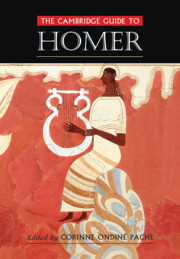Book contents
- The Cambridge Guide to Homer
- The Cambridge Guide to Homer
- Copyright page
- Contents
- Figures
- Notes on the Contributors
- General Introduction
- Part I Homeric Song and Text
- Introduction
- Homeric Epic in Performance
- Homeric Poetics
- Homer in a World of Song
- Epic Traditions
- Mythic Background
- The Language of Homer
- From Song to Text
- Key Topics
- Achilles
- Ancient Near Eastern Epic
- Batrakhomuomakhia (The Battle of Frogs and Mice)
- Catalogues
- Dreams
- Early Editions
- Ekphrasis
- Epic Cycle
- Epithets
- Formula
- Gods and Goddesses
- Hesiod and Homer
- Home
- Homer and Indo-European Myth
- Homer and the Alphabet
- Homeric Body and Mind
- Homeric Dialects
- Homeric Humor
- The Homeric Hymns
- Homeric Scholia
- Hospitality
- The Iliad: An Overview
- Immanence
- Kleos
- Lament
- Margites
- Meter
- Narrative
- Odysseus
- The Odyssey: An Overview
- Panathenaia
- Panhellenism
- Pisistratus
- Rhapsodes and the Homēridai
- Ring Composition
- Similes
- Speech
- Trojan Horse
- Troy
- Type Scene
- Part II Homeric World
- Part III Homer in the World
- Bibliography
- Index
Immanence
from Key Topics
Published online by Cambridge University Press: 22 February 2020
- The Cambridge Guide to Homer
- The Cambridge Guide to Homer
- Copyright page
- Contents
- Figures
- Notes on the Contributors
- General Introduction
- Part I Homeric Song and Text
- Introduction
- Homeric Epic in Performance
- Homeric Poetics
- Homer in a World of Song
- Epic Traditions
- Mythic Background
- The Language of Homer
- From Song to Text
- Key Topics
- Achilles
- Ancient Near Eastern Epic
- Batrakhomuomakhia (The Battle of Frogs and Mice)
- Catalogues
- Dreams
- Early Editions
- Ekphrasis
- Epic Cycle
- Epithets
- Formula
- Gods and Goddesses
- Hesiod and Homer
- Home
- Homer and Indo-European Myth
- Homer and the Alphabet
- Homeric Body and Mind
- Homeric Dialects
- Homeric Humor
- The Homeric Hymns
- Homeric Scholia
- Hospitality
- The Iliad: An Overview
- Immanence
- Kleos
- Lament
- Margites
- Meter
- Narrative
- Odysseus
- The Odyssey: An Overview
- Panathenaia
- Panhellenism
- Pisistratus
- Rhapsodes and the Homēridai
- Ring Composition
- Similes
- Speech
- Trojan Horse
- Troy
- Type Scene
- Part II Homeric World
- Part III Homer in the World
- Bibliography
- Index
Summary
The term “immanence” or “traditional referentiality” denotes the ability of formulaic components in oral poetry ‒ such as epithets, formulaic phrases, and type-scenes ‒ to convey meaning that they acquire from traditional usage rather than from the definitions of the words they comprise. When oral poets repeatedly use a formulaic structure in contexts that bear some thematic resemblance to each other, the formula comes to be associated with that unifying theme and can then evoke it when redeployed in a new context.
- Type
- Chapter
- Information
- The Cambridge Guide to Homer , pp. 165 - 166Publisher: Cambridge University PressPrint publication year: 2020

